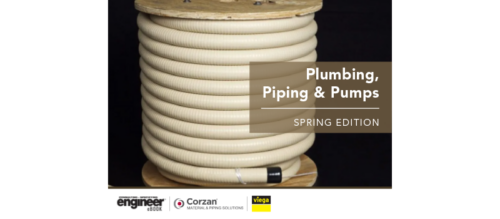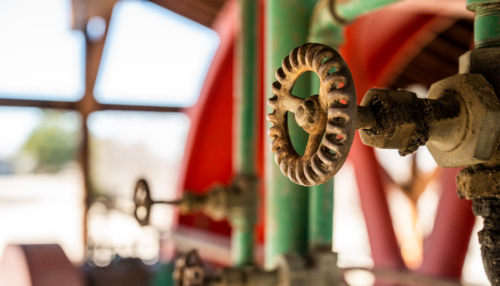Costly Corrosion and Scaling of Metal Pipes Prompt Re-pipe Job
If you’ve ever been to Austin, Texas, chances are you’ve seen the Westgate Building, one of the oldest high-rises in the city. Located adjacent to the State Capitol and Governor’s mansion, the 25-story Westgate Building is home to numerous high-level attorneys and state legislators. In addition to the upscale condos, the building, which was originally built in the 1960s, also hosts a number of law offices, as well as a credit union.
By the late 1990s, however, the building, despite its upscale location and lavish interiors, was experiencing a tremendous increase in the number of leaks from the metallic plumbing pipes – leaks which caused the need for ongoing costly, not to mention, disruptive repairs.
“The building was literally a time bomb,” explained Bill Fowler, president and founder of HHCC, Inc., the remodeling contractor chosen to solve the plumbing problem. “The galvanized pipe was springing leaks on almost a weekly basis. Plus, the very hard Austin water had caused greatly reduced water flow due to mineral deposits within the pipes.”
So in 2000, after experiencing an onslaught of complaints from tenants, the Westgate Owners Association made the decision to re-pipe.
“They knew they had to do something,” said Fowler. “They had put so many patches on the system; it was shot. It was only a matter of time before a major catastrophe occurred.”
However, initial bids to tackle the 120-unit re-pipe project were somewhat alarming for the condo association. According to Fowler, several larger mechanical contractors had estimated the job as high as $2.5 million.
“We chose to attack the job very differently,” Fowler explained. “The other companies proposed removing the existing piping and reinstalling the new pipes in the same location. The problem with this approach was the existing piping was insulated with asbestos, which warranted very expensive abatement work. We decided to take an entirely different approach and leave the existing piping unmolested, thereby avoiding asbestos abatement. Instead, we routed the new piping differently from the original design. The new piping was routed through the stairwells and went down the central corridors. We devised a decorative crown molding to hide the pipes. This allowed us to save money by inconspicuously running pipe down the halls; plus it made for an elegant looking corridor.”
Another significant difference in the HHCC bid was the specification of FlowGuard Gold CPVC pipe and fittings instead of an all-metallic piping system. As a result of the innovative design and the conversion to CPVC pipe, Fowler’s company was able to save the Westgate Owners Association in excess of a million dollars. And in the process, it also garnered HHCC the coveted Lone Star Award (2001) for best commercial project, which was presented by the Texas Association of Builders.
According to Fowler, much of the cost difference came down to labor savings. He estimated he was able to reduce his installation time by at least 50 percent by switching to CPVC pipe. Not only could the FlowGuard Gold system be installed faster, but it also allowed for fabrication on site. And because it was not as rigid as metal, Fowler discovered that his crew could work in smaller areas using fewer couplings and joints.
“We chose to go with the FlowGuard Gold CPVC system not only because of the cost savings, but also because of the previous problems with metal,” said Fowler. “We knew there was aggressive water with a high mineral content in the Austin area. It had already caused corrosion and scale buildup which we knew we could avoid by using CPVC. We also knew, from previous experience, that the product had an excellent track record, including fewer problems with leaks and virtually no callbacks.”
Given the expensive furnishings and elaborate decor, another consideration was the risk of fire. Fowler did not want to use a torch in the building to solder metal pipe and risk a very costly fire. The FlowGuard Gold system does not require soldering; it utilizes a one-step solvent cement joining system that creates a permanent, reliable bond within minutes. Not only is the system safer than metal soldering, it’s also cleaner, eliminating the mess of oil and metal debris.
“You would have to see some of these units to truly appreciate our challenge,” said Fowler. “Many contained priceless artwork that we had to work around. In some cases, we were removing expensive cabinets with granite and exotic hardwoods. In other cases, there were animal hides on the walls instead of wallpaper.”
Also a challenge was the deadline. HHCC completed the work over a six-to-seven-month time period, which included all of the cutting, patching and repainting. Fowler estimated that his company had more than 1,000 paint matches to handle. More important, however, was that, as promised, his professionals were in and out of each unit within a few days. “That’s what the Condo Association really liked,” said Fowler. “We didn’t have to disrupt the tenants. Each day we went in and were able to clean up adequately so that tenants could be living in the complex throughout the renovation.”
Fowler’s preference for FlowGuard Gold CPVC is also a result of the product’s superior performance in the areas of noise and condensation. “Noise is always an issue and even more so with high-end units,” Fowler noted. “With copper, we’d hear complaints about noise. But the FlowGuard Gold system is definitely quieter; that’s an added plus.”
A test conducted by NSF International, in fact, confirms that FlowGuard Gold pipe is four times quieter than copper. It not only minimizes water hammer, but also virtually eliminates water flow noise.
“We also liked the fact that there is less condensation than with metal pipe,” remarked Fowler. “This is a real issue these days with all the mold concerns. When using copper pipe, we have to use more insulation to offset problems with condensation.”
Speaking of risk, Fowler was quick to point out that, in the end, the final decision to convert to FlowGuard Gold pipe and fittings was based on the risk of premature failures and possible flooding. “When you’ve got 25 floors that could possibly be flooded from a pipe that has gone bad, you cant’ take any chances,” he said. “The previous metal pipes in the building were so corroded in spots that you could literally twist or snap off the pipe.”
Tremendous cost and labor savings. A more reliable system. Faster, cleaner and safer installations. Fewer callbacks. And less noise and condensation. These are the reasons that have made Fowler such a strong advocate of a FlowGuard Gold CPVC plumbing system.
“I like the product and believe in it so much that I installed it in my own six-story home,” Fowler said. “You can’t get any stronger endorsement.”
Do you have experience and expertise with the topics mentioned in this content? You should consider contributing to our CFE Media editorial team and getting the recognition you and your company deserve. Click here to start this process.




